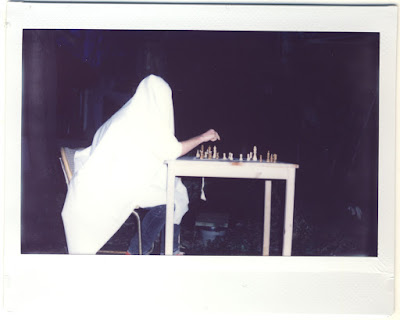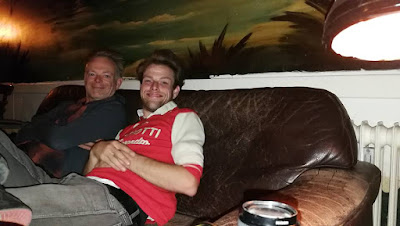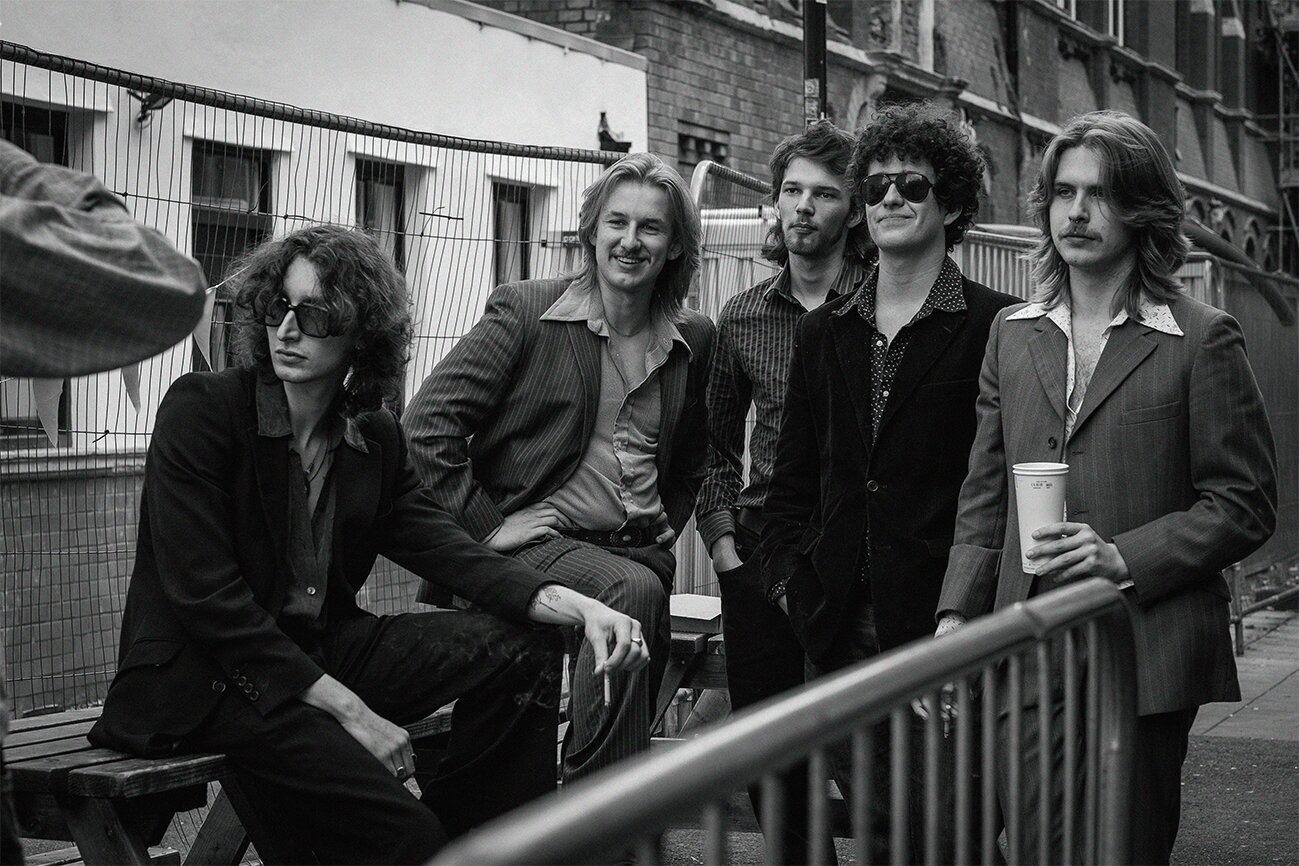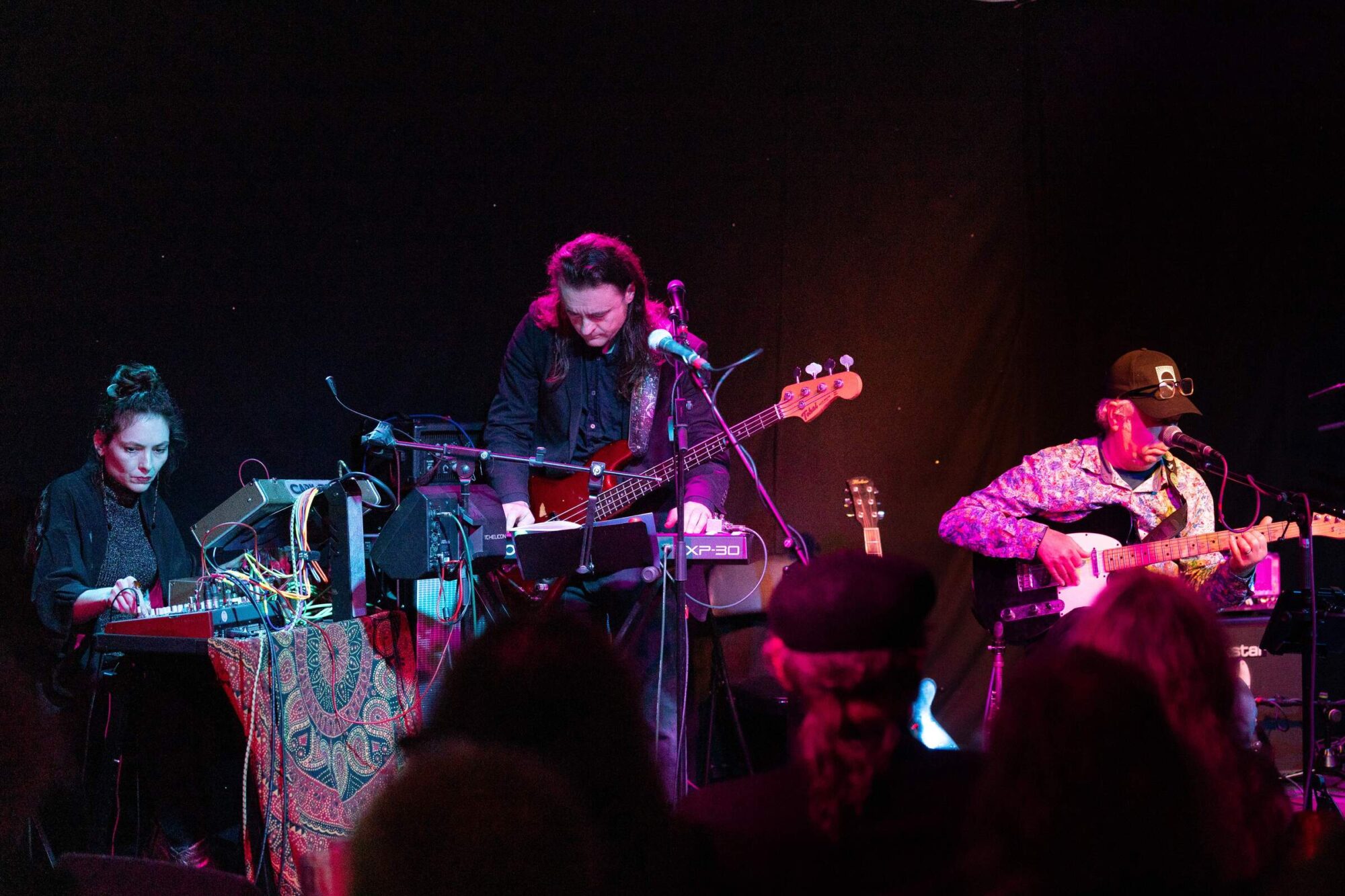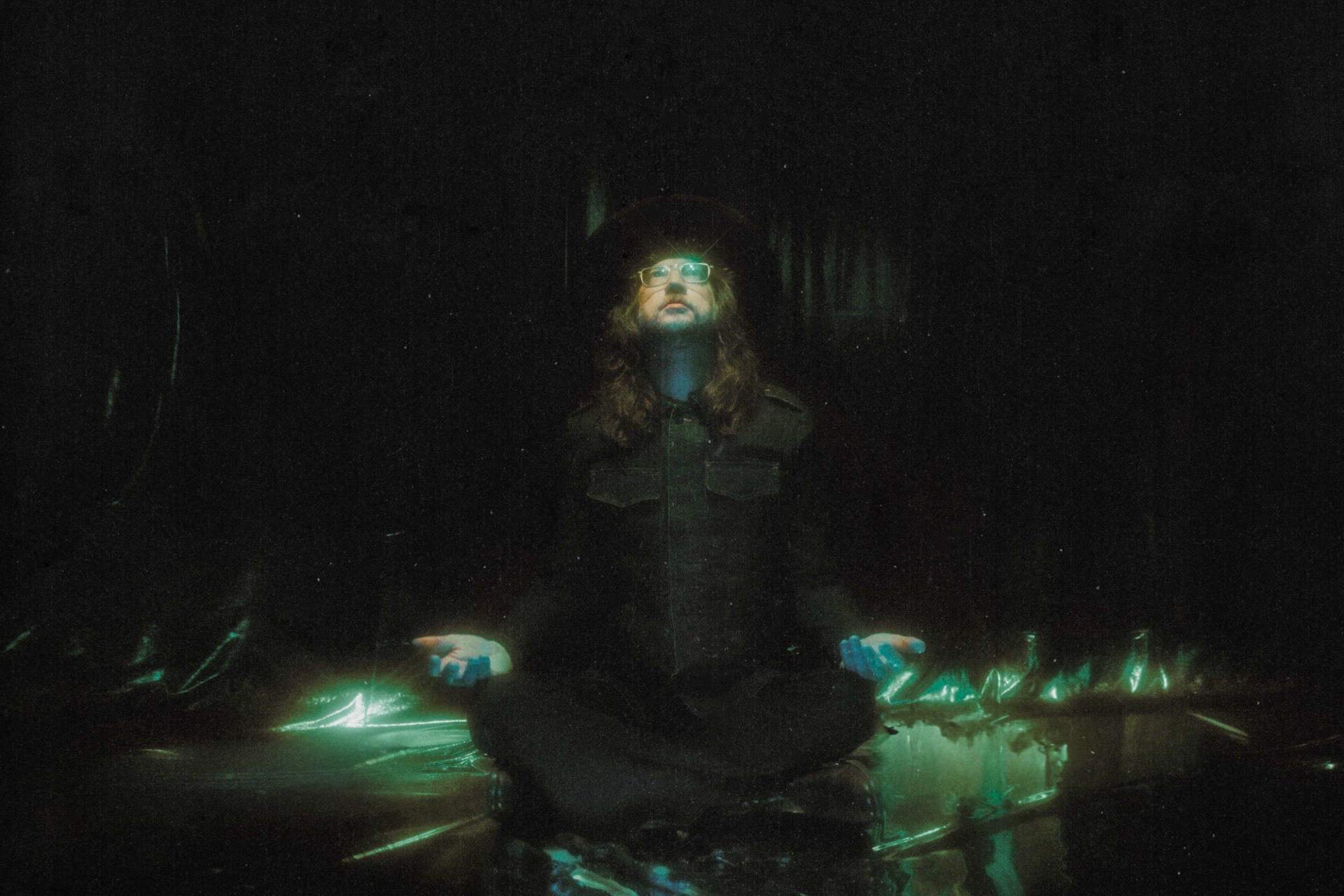Beyt Al Tapes
“Fatigue, boredom and pain are ‘real’ experiences, and then you can escape reality”
Beyt Al Tapes uses used tapes as his main instrument; he cuts them up, dubbs them, fast-forward and rewinds them. Unprecize Music, his fourth release, is out now on Chocolate Monk.
Do you see what you do with Beyt Al Tapes as collage music? Is what you do: collecting recordings, then selecting and editing them into something that can be a good track, and later on a good record? Is this how you work?
Niels Latomme: Depending on the piece. Some are created while noodling with tape machines: recording something, slowing it down, recording it a second time, layering them with 3 or 4 tape players, creating loops out of those recordings, pitching them. Sometimes new sounds and idea’s pop out, and then I start working on them in the same way. I tend to strip down sounds, and distill a couple of bits and idea’s from all the mess they were first.
For a live show, mostly I prepare master tapes with certain sounds and idea’s, using the same procedure. The tape-players become instrument in their own right, transcending their original use for recording. Tracks that end up on a record are mostly a ‘version’ of an idea, on which I elaborate playing live. Failure is a big part in it, cause it opens a doorway to something which I didn’t expected.
The collage is a part in creating sound, I use used tapes, record over them, cut them literally up and randomly paste them together. Or I record for example a vocal poetry improvisation on tape, and while making vocal sounds, randomly fast-forward and backward the tape. ‘Tape-collage’ has a certain aesthetic quality to it that I like to work with. I when I stumble on the work of the revue OU catalogue, and the stuff by Vom Grill, I found myself leaving behind effect pedals and Casio synths and turned into using cassettes and voice. I found there an aesthetic and method that created the sort of sound I like. Sound on tape becomes literally something tactual; on magnetic tape sounds becomes an object, and the material properties affect the sound.
Other pieces come from thinking a lot about sounds and musical idea’s; and about the poetic content pieces can have. Before I record anything, I have already thought out a loose concept or procedure to create a composition. It can be things about fake ethnic music, or about how certain conceptual gestures and actions can produce a piece. And then it’s a matter to execute it. Half of the time that fails, but then again, this can produce new sounds or ideas. So there’s not much collage happening.
Part of these slow and long processes is to find a space where rational thinking about music is left behind, and where the music, or pieces seems to speak through me, in the best moments it feels like I’m just the messenger of those pieces, to which I can’t relate emotionally, nor rationally anymore.
So it’s definitely not a standard procedure of collecting, selecting, editing. Rather it’s a continuous back and fourth play of tape manipulation, thinking in thin air and recording. ‘A good Track’, or a ‘Good Album’ isn’t so much my concern. The albums and tracks are more a documentation or a version of action performed in real time. Compiling a record, or a track is in that way certainly a ‘collage’, like you would collect some pictures from a newspaper, and make something new out of them…
Do you see yourself as a musician? Or, because of your working method, more as a composer or editor? Or is that a difference you don’t want to make, the difference between a ‘real’ (skilled) musician and a non-musician?
Pfff, I can’t really answer to this question, I think it’s a semantical issue, it’s about defining, about how people perceive and about self-presentation — which is a key to having some sort of musical career. I’ve been always too lazy to start a proper training in any instrument or composition. But I’ve got enough energy to learn a lot about sounds and composition by trail and error.
To say that I’m not concerned about self-presentational issues, would be a lie, I think about them. But then Beyt al Tapes enters the domain of my day job — supporting musicians. And when BAT enters that space, it’s tiring and boring. So last couple of years I’m not thinking about it so much, and just play, and explore the sonic and poetical layers of sound. It’s all about a sort of freedom I suppose, or at least the ghost of freedom.
I remembered, while working on the pieces, I was sitting on a terrace in Berlin and I wrote a letter (pen and paper) to Lieven Martens about the wish to make a real record, a record that is not about self-presentation, or representation itself. I wanted to record a ‘real’ thing (not so much an authentic thing), but a record that has no explanation, but are sounds on itself… but that refers more to your question about if I’m a romantic, I suppose.
Maybe I feel more related to visual artists like John Baldessari… But instead of working with images, I use sounds. That’s why I like to do stuff with Joris Vandemoortel, he is definitely a visual artist. Gestures and actions are the main key behind his works. The works are a residue of the action. My records are like that as well.
What does ‘working on a record for three years’ mean?
Produce sounds, fuck them up, forget them, play the master tapes live, retake them, edit them, forget them, sit a weekend in an empty house on a hill thinking about them, put them together as record, forget this again, listen, etc…
I tend to take long to decide once a piece is finished. It’s not about perfection, but literally about time management. I don’t make music very often, as most of my day job is about other people’s music. When I’m not working for them, I’ll choose to not think about music at all… and to cycle. So to get to the point that I start working on stuff, I have to work through a lot of excuses not to make music. So that takes a long time.
How did the people of Razen got on this record?
Two summers ago, Razen asked me to record a session of three days in a church. Those recordings became their album The Xvoto Reels — obviously recorded on reel to reel tape. My gear was old and not very stable, so a lot of the recordings ‘failed’ and sounded like something or someone else came into play.
One of the short pieces failed, the instruments pop in and out of the noise and Razen couldn’t use it for the record.
But I kept getting back to those 3 or 4 minutes of music because I really like the interplay of their music materializing and disappearing from the tape hiss. The beauty in it is that it reminds me of the broken string theory from quantum mechanics: particles pop in and out of existence, lending energy from the future (most probably I don’t understand the theory fully, and most probably I’ve understood it completely wrongly).
At the same time I figured out how to create an eternal descending or lifting tone — first created by Shepard and Riset. So I combined the two pieces, and there you go… I asked Brecht and Kim if they were OK with it to use it, and they like the idea of the death of the author that is key to the piece: I have not so much to do with the piece, as Razen created the music, the eternal lifting tone is by Shepard/Riset and the title is stolen from James Tenney.
Who’s Ode Windels?
She created the first piece, while playing the violin. She’s on the pictures as well. Last but not least, she’s important.
Who’s the woman with the white dog on the first picture?
I don’t know, it’s a picture I took somewhere, and I forgot who and where it was. Also my photo’s are created like the music: I tend to disappear a bit — I watch or record. I remember vaguely she was Serbian or Slovenian.
Why is there ‘Uttar Pradesh, India’?
It was the first thing I could select when setting up the bandcamp.
How did you get on Chocolate Monk?
I met Dylan a couple of times, and of course I follow his label since long. Chocolate Monk is a milestone for obscure music! I sent the tracks to him. He liked it, so he put it out. No bullshit, great guy! He thought the band was called ‘Kant A’, I liked that. His festival is amazing as well, I hope there’s a new edition soon.
From the text on Chocolate Monk: do you see yourself as a Romantic? Do you see yourself as an explorer?
Both I suppose. Steve Marreyt wrote very precise liner notes for the previous record, You Are Now Entering Zimbabwe, those explain all. Romantic in the oldschool meaning — chasing ghosts of what could be possible, but never actually capture, or find them, but that’s part of the game — certainly, yes. Explorer too. It’s key of the way I create music. I don’t like to create something that already exists (even in my head), I think that music’s goal (or my music’s at least) is to explore new forms, idea’s and even emotions — which is an heir to the old Avant-Garde ideas, which are in a way descendants of the Romantics.
Escaping is part of Romanticism — I like to escape the social constructed ‘reality’, mostly through a dialectic process that goes over the ‘real’. In cycling you have to go through a complex process of fatigue, boredom and physical pain to actually enjoy the stupid act of just pedaling from here to there, up and down, and back to home. Fatigue, boredom and pain are ‘real’ experiences, and then you can escape reality. Making music has similarities, for me at least — I’m pretty sure other people have other pleasures in making music.
My favourite tracks on the record are the most minimal ones, with the sinus waves; “Stories of the Second Story”, “The Composers” and “Unprecize Music”. I guess it’s synthesizer music. What kind of synthesizer did you use on these recordings? How did you make this sinus waves?
Thanks. On “Stories of the Second Story” … and “Unprecize Music”… it’s a MBF modular synthesizer — technically you can’t speak about pure sinus waves. On “The Composers” they are computer generated pure sinus waves. But recorded on tape, to add some extra hiss. On the MBF you have to create a certain patch with cables, between the oscillator and some nerdy stuff; on the computer you just click ‘generate tone’, and set some parameters. It’s basic sound technic. Exploring is also something very prosaic.
– Joeri Bruyninckx
© Copyright http://www.psychedelicbabymag.com/2018
Array

